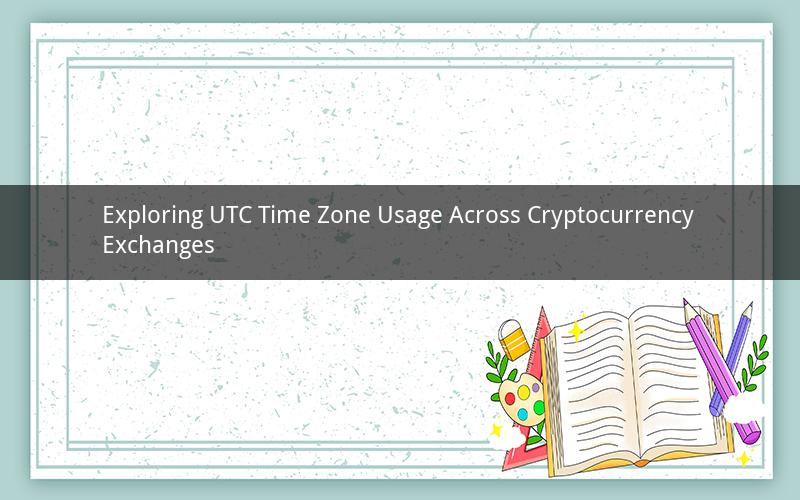
Cryptocurrency exchanges play a pivotal role in the global financial ecosystem, facilitating the buying, selling, and trading of digital assets. One of the key aspects that traders and investors often consider when choosing an exchange is the time zone in which the platform operates. This is because the use of UTC (Coordinated Universal Time) time zone can significantly impact trading activities and decision-making processes. In this article, we will delve into the question of whether all cryptocurrency exchanges use the UTC time zone and discuss its implications for traders and investors.
The Importance of Time Zone in Cryptocurrency Exchanges
Time zone is a crucial factor in the cryptocurrency market due to its 24/7 nature. Unlike traditional financial markets, which have specific trading hours, the crypto market operates around the clock. This means that traders and investors can engage in buying and selling activities at any time, regardless of their geographical location. However, the use of UTC time zone can create challenges and opportunities for traders and investors.
UTC Time Zone: What Is It?
UTC is the time standard commonly used across the world. It is based on the mean solar time at the Prime Meridian (Greenwich, London, UK) and is not affected by daylight saving time. UTC is used as a reference point for all time zones, which are derived from it. By using UTC, cryptocurrency exchanges can provide a standardized time reference for their users, making it easier to track trading activities and market movements.
Do All Cryptocurrency Exchanges Use UTC Time Zone?
The answer to this question is not straightforward. While many exchanges use UTC time zone, others may opt for their local time zone or a different global time zone. Here are some factors that influence the time zone used by cryptocurrency exchanges:
1. Geographical Location: Exchanges based in countries that do not observe daylight saving time or have unique time zone rules may prefer to use UTC. This is because it simplifies the process of aligning trading activities with global markets.
2. Target Audience: Exchanges often tailor their services to cater to a specific audience. If the majority of their users are located in regions that do not follow UTC, the exchange may opt for a local or regional time zone to better serve their customers.
3. Regulatory Requirements: Some countries may have specific regulations regarding the use of time zones in financial transactions. Exchanges operating in such jurisdictions may need to comply with these requirements.
4. Technological Constraints: In some cases, the technology used by exchanges may not support the seamless transition between different time zones. As a result, they may continue to use UTC for consistency and reliability.
Implications of Using UTC Time Zone in Cryptocurrency Exchanges
The use of UTC time zone in cryptocurrency exchanges has several implications for traders and investors:
1. Market Transparency: By using a standardized time reference, exchanges can ensure that all trading activities are recorded and displayed accurately. This promotes market transparency and helps traders make informed decisions.
2. Global Market Access: Traders can easily compare trading activities across different exchanges and time zones. This enables them to identify patterns and trends in the market and capitalize on them.
3. Risk Management: The use of UTC time zone helps traders manage their risks more effectively. By having a clear understanding of market movements, they can adjust their trading strategies accordingly.
4. Regulatory Compliance: Some regulatory authorities may require exchanges to use UTC time zone to ensure fair and transparent trading practices.
5. Language and Cultural Considerations: Traders and investors from different regions may find it easier to understand and navigate exchanges that use their local or regional time zone.
Frequently Asked Questions (FAQs)
Q1: What is the advantage of using UTC time zone in cryptocurrency exchanges?
A1: The primary advantage is that it provides a standardized time reference for all trading activities, promoting market transparency and facilitating global market access.
Q2: Can using UTC time zone affect my trading strategy?
A2: Yes, it can. Traders need to be aware of the time zone differences when comparing trading activities across different exchanges. This can help them identify patterns and trends in the market.
Q3: Why do some exchanges use their local time zone instead of UTC?
A3: Exchanges may choose to use their local or regional time zone to cater to the needs of their target audience or comply with regulatory requirements.
Q4: How does the use of UTC time zone impact my risk management?
A4: By providing a clear understanding of market movements, UTC time zone can help traders manage their risks more effectively.
Q5: Can I trade cryptocurrencies at any time of the day?
A5: Yes, you can trade cryptocurrencies 24/7. However, the use of UTC time zone can help you track trading activities and market movements more accurately.
In conclusion, while not all cryptocurrency exchanges use the UTC time zone, many do for various reasons. The use of UTC time zone has several implications for traders and investors, including market transparency, global market access, and risk management. By understanding these implications, traders and investors can make informed decisions and navigate the cryptocurrency market more effectively.